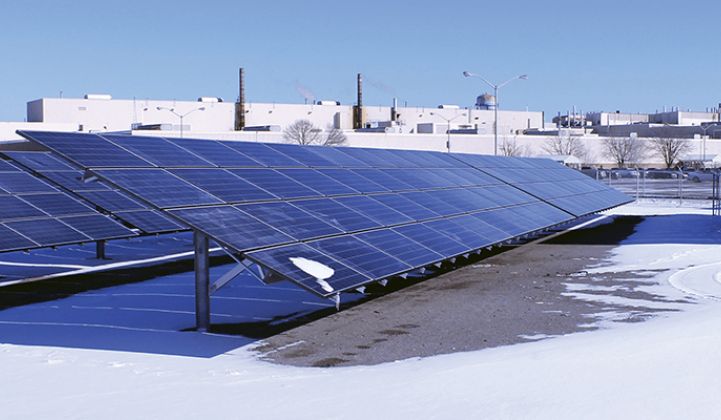ReneSola has confirmed that it will sell 100 percent of its solar manufacturing and LED distribution businesses -- and the liabilities they carry -- to company Chairman and CEO Xianshou Li.
The restructuring takes the company’s debt-laden operations private, enabling the solar project development arm to focus on expanding in the global market, and in China in particular.
The deal, confirmed Monday, will offer ReneSola and its shareholders “significant value from a new asset-light business model, a stronger balance sheet and higher valuation multiples," said CFO Maggie Ma, in a statement.
Through ReneSola Singapore (SGP), Li will hold all of ReneSola’s assets and liabilities related to its manufacturing business, which includes polysilicon, solar wafer, solar cell and solar module manufacturing. He will also own the LED business.
Once the transaction has closed, which is expected to take place by the end of the year, it will remove more than 3 billion Chinese yuan (USD $452 million ) from ReneSola’s balance sheet. It will also cancel approximately $217.3 million of intercompany payables ReneSola owes to SGP, according to a press release.
“The debt burden associated with the manufacturing activities and the margin compression of manufacturing…is the primary reason why our CEO decided that it would be best for the future of the public company to be relieved of that burden,” said Doran Hole, CFO of ReneSola Power Holdings, a subsidiary of ReneSola’s U.S. project business, in an interview at Solar Power International earlier this month.
The public company will be left with the downstream project development business for commercial-scale solar projects, which is heavily focused on the Chinese market, Hole said. The U.S. ranks second in terms of ReneSola’s pipeline. The company also has operations in Europe, Canada, Southeast Asia and Japan.
“There’s a discussion going on about coming back to the capital markets in early 2018 to raise additional capital to fund the project development business,” he added. The funds would be used to continue ReneSola’s develop-and-sell strategy for solar projects, with the exception of assets in China, which the company intends to keep on its balance sheet because they produce solid returns. This strategy may be revised, however, as the markets change, Hole said.
ReneSola is particularly keen on the Chinese market because of the massive growth potential. The company currently owns 130 megawatts of distributed solar in China and will add another 70 megawatts by the end of the year.
“We expect to have the ability to potentially add another 400 megawatts in 2018,” said Hole. “So there's quite a large opportunity for us in China.”
Overall, the Chinese solar market is targeted to reach 200 gigawatts of cumulative installed capacity by 2020. The government is specifically pushing for development on rooftops as demand for utility-scale projects dries up.
For commercial solar projects in China that are on the corporate side of meter -- which represent the bulk of the future opportunity, according to Hole -- developers benefit from the electricity rate secured from the offtaker, plus a federal incentive and a provincial incentive in some areas. By privatizing the manufacturing business, ReneSola’s CEO “wants to put the company in a position to be able to access the capital to exploit that opportunity,” Hole said.
ReneSola first revealed that it could be forced to sell off its heavily indebted solar manufacturing business in August, in order to regain listing compliance with the New York Stock Exchange.
On the manufacturing front, ReneSola has always been a smaller player in China, with just 1.5 gigawatts of production capacity. As a Chinese panel maker, the company has also been subject to tariffs in the U.S. from SolarWorld’s anti-dumping and countervailing duties cases, and it stopped selling panels in the U.S. last year as a result.
Under the new arrangement, ReneSola will retain the preferential right to acquire solar products from SGP on the same terms as such products are offered to any third party.
ReneSola’s financial woes stem primarily from it having invested in polysilicon at a bad time. Still, it isn’t the only company undergoing a restructuring. Some of ReneSola’s competitors have also privatized their businesses in recent months. Jinko sold off its downstream business, while Trina went entirely private -- selling its shares to CEO and chairman Jifan Gao.
“We're going to be the ones that privatize the manufacturing business, so there is a trend toward going private,” said Hole. “But which part of the business, or is it all of the business? Everyone seems to be making a different decision about that.”
Pressure from the stock market has forced this shift, he added.
“If you talk to equity analysts and you talk to investors, you will probably hear repeatedly that these stocks are undervalued because [solar] companies have a hard time explaining to the market what it is they do and how they make money doing it,” Hole said. “A lot of these companies are, like we were, vertically integrated. They have multiple businesses with multiple profitability metrics, and that's very hard to explain to a public equity market.”
ReneSola has bet the future of its public arm on downstream development, as well as asset ownership in certain jurisdictions where the incentives are right.
Company leaders will detail the plan on a business update and financial results call today, Wednesday, September 27 at 8:30 a.m. Eastern Time.



